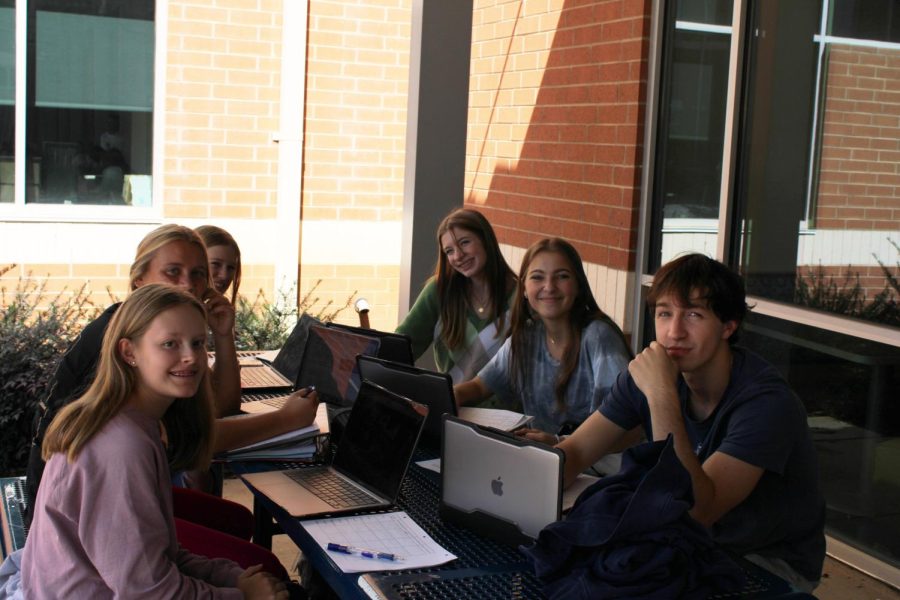Staying Social at School
How one’s social life can affect their academics
Zeb Whelchel, Caroline Nichols, Caroline Feather, Kaitlyn Anderson, Maribel Washburn and Taylor Smith have a group study session in one of the many collaborative areas Spartanburg High School offers.
September 12, 2022
There have been numerous articles and studies published about how environment can affect a person’s mental state and academic abilities, but what of social environment?
Debates such as nature vs. nurture have furthered the investigation, bringing into question the many different aspects of social environment and how it can affect students in school and in their personal lives. Nature vs. nurture is a debate on whether it’s genetics that determine an individual’s personality traits and academic abilities, or if it is how an individual is raised and the environment.
Caroline Hutchins (11) is a Teacher Cadet and is currently learning about how early education can affect a child.
“The environment in which you are surrounded in as a young child sets you up in how you look at education and how your future in school will turn out. If you are surrounded in a negative environment, your views on school, your self-esteem, your engagement, your motivation and your success to name a few are impacted greatly. The family impact on the education of children can be impacted tremendously,” Hutchins said.
While early education can impact the academics of a student, another factor is the role models and support of the educators.
In an article by the Council for Children’s Rights, the staff talks about how the influences of teachers can affect a student’s future.
According to www.cfcrights.org, “There are school environments that appear more like prisons, fraught with racial tensions and biases, and lack supportive staff, which negatively affect students’ perceptions and futures. The feeling of not belonging or being welcomed into their school can negatively impact attendance and graduation rates.”
Having a healthy social life and being accepted or having a sense of belonging has a positive effect on a student’s mental health helping them succeed in class. School-offered clubs and activities are a good way for students to meet others with similar interests and experiences, while learning how to balance their work and social life.
Addie Kate Martin (12) is a member of different clubs and activities such as Beta club, Teacher Cadet, Track and Field, and Cross Country at Spartanburg High school and believes that everything she participates in has been integral in her life.
“I think that in high school, sports are a good way to get to know people. They also add to the high school experience and teach students how to balance work, school and other aspects of their life,” Martin said.
Due to the stress of schoolwork, having a strong support system in place is beneficial to students. A high amount of stress can be detrimental to a student’s mental health possibly causing their work ethic and grades to suffer. Teachers have recently begun to confer with each other in order to space out tests and quizzes, which helps students safely manage the amount of coursework and studying they need to do daily.
Julia Brantley (11) enjoys and appreciates the support system that the school offers to students.
“The students and teachers here care about each other. The guidance counselors and teachers will help you work through your stress and many of the teachers will space out tests in order to give us time to prepare,” Brantley said.
Human beings are social creatures, and high schoolers are no exception. Social interactions can shape one’s social and emotional growth, along with one’s personalities. Whether a person is introverted or extroverted, human interaction is a necessary and crucial part of life. Withdrawing from others or being shunned by their social environment can negatively affect a student’s mental health and, by extent, their academics.
Having poor mental health can be just as detrimental as poor physical health to a student’s wellbeing.
Alison Little is a psychology teacher at Spartanburg High School and is able to see how students a student’s social life can affect their grades and schoolwork.
“Some students can manage tasks and social life well, but when tensions of loneliness, fitting into a group/social norm or drama arise, it can be detrimental to other areas of life such as change in attitude, irregular sleep patterns and a change in motivation which can lead to a student spending too much or too little amount of time on schoolwork,” Little said.




